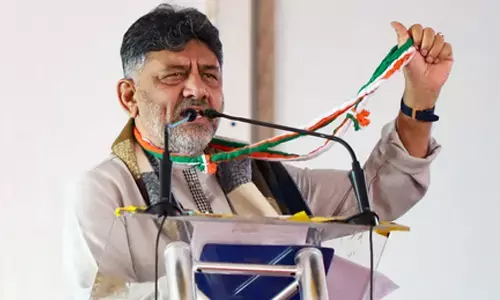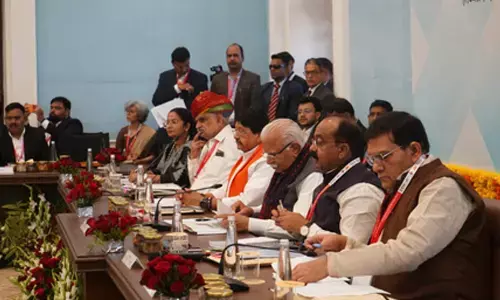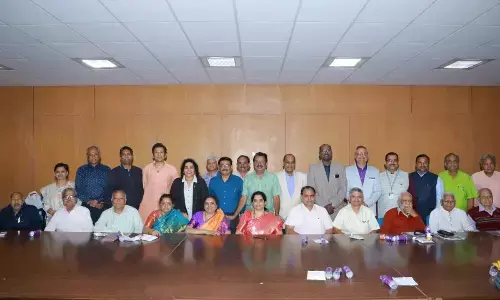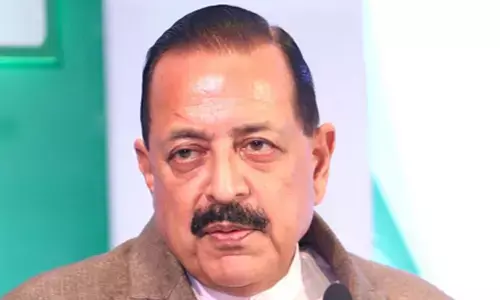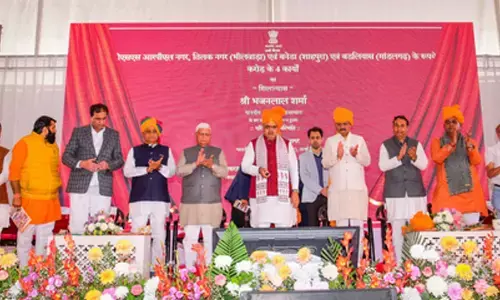The Philosophy of the Constitution
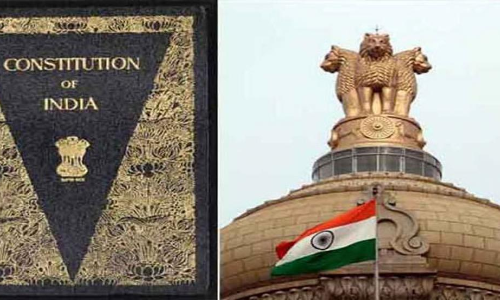
Before the framing of the constitution started, an Objectives Resolution (the resolution that defined the aims of the Assembly) was moved by Nehru in 1946. This resolution enshrined the aspirations and values behind the Constitution making.
Objectives Resolution
Before the framing of the constitution started, an Objectives Resolution (the resolution that defined the aims of the Assembly) was moved by Nehru in 1946. This resolution enshrined the aspirations and values behind the Constitution making. On the basis of the Objectives Resolution, India's Constitution gave institutional expression to the fundamental commitments:
equality, liberty, democracy, sovereignty and a cosmopolitan identity. This made the moral commitment to establish a government that will fulfil the many promises that the nationalist movement held before the people of India.The histoic objectives Resolution was moved by Jawaharlal Nehru on 13 December 1946 and was adopted Unanimously on 22 January 1947. The objectives resolution became the basis for the preamble.
Preamble
"WE, THE PEOPLE OF INDIA, having solemnly resolved to constitute India into a SOVEREIGN, SOCIALIST, SECULAR, DEMOCRATIC REPUBLIC and to secure to all its citizens:
JUSTICE, social, economic and political;
IBERTY of thought, expression, belief, faith and worship;
EQUALITY of status and of opportunity;
and to promote among them all
FRATERNITY assuring the dignity of the individual and the unity and integrity of the Nation;
IN OUR CONSTITUENT ASSEMBLY this 26th day of November, 1949, do HEREBY ADOPT, ENACT AND GIVE TO OURSELVES THIS CONSTITUTION."
The term preamble refers to the introduction or preface to the constitution. It contains the essence or summary of the constitution. Though it is a part of the constitution it is nonjusiciable and cannot be enforced in a court of law. As the Supreme Court has observed the preamble is a key to unravel the minds of makers of the constitution.
Ingredients of the Preamble
The preamble reveals four ingredients.
1) Source of the authority of the constitution:
The authority is derived from the people of India .
2) Nature of Indian state:-India has been declared as sovereign,socialist,secular,democratic and republican polity.
3) Objectives of the consitution:- Justice, liberty,equality and fraternity.
4) Date of adoption:-Adopted on November 26 1949.
Keywords In preamble
1. Sovereign
Means India is neither a dependency nor a dominion of any other nation but an independent state. It is supreme both internally and externally. India didn't sever all ties with the British common wealth. The conception of the common wealth itself has under gone a change owing to India's decision to adhere to the common wealth without acknowledging allegiance to the crown, the symbol of unity of the old British Empire.
It is this decision of India that has converted the British common wealth a relic of imperialism- into a free association of independent nations under the honorable name of the "Common wealth of nations". This historic decision took place at the PM's conference at London on April 27, 1949.
It is to be noted that this decision is extralegal and there is no mention of it in the constitution of India. It is a voluntary declaration and indicates a free association and no obligation. The new association was an honorable association between Independent states.
The crown of England was considered as a symbolic head of the common wealth and having no claim to the allegiance of the citizens of India. Even if the king or queen of England visits India He/She will not be entitled to any precedence over the president of India.
As a member of the common wealth, India has a right to be represented on common wealth conferences, decisions at common wealth conferences will not be binding on her and no treaty with a foreign power or declaration of war by any member of the common wealth will be binding on her without her express consent.
As aptly pointed out by Nehru it is an agreement by free will to be terminated by free will. India's membership of UN is in no way constitutes a limitation on her sovereignty. Being a sovereign state, India can acquire a foreign territory or cede parts of its territory in favor of a foreign state.
Promotion of International Peace
The great magnamity with which India took this decision in the face of a powerful opposition at home which was the natural reaction of the manifold grievances under the imperialistic rule, and the great fortitude with which the association has still been maintained under the pressure of repeated disappointments, the strain of baffling international alignments and the 1976 upsurge of racialism in England, speak volumes about the sincerity of India's pledge to contribute to the promotion of world peace which is reiterated in Article 51 of the constitution.
Thus though India declares her sovereignty to manage her own affairs in no unmistakable terms, the constitution is not a isolationist or jingoist. Indian sovereignty is consistent with the concept of "one world",international peace and amity.
The intenational convention and norms can be read into them in the absence of enacted domestic law occupying the field when there is no inconsistency between them. The rules of customary international law which are not contrary to municipal law shall be deemed to have been incorporated in the domestic law, shall be followed by the courts of law.
2. Socialist
Even before the term was added by the 42nd amendment in 1946,the costitution had a socialist content in the form of certain directive Principles of State Policy. The congress party itself adopted a resolution to establish a socialistic pattern of society in its avadi session in 1955. How far this aim has been achieved is debatable.
However the trend had been from a socilistic pattern towards a socialistic state, bringing industries and private entreprises under state ownership and management and carrying on trade and business as a state function.
The word socialist was inserted in the preamble by the 42nd amendment in 1976. It is to be noted however that the socialism envisaged by the Indian constitution is not the usual scheme of state socialism which involves nationalisation of all means of production and the abolition of private property. As stated by PM Indira gandhi "we have always said that we have our own brand of socialism.
We will nationlise the sectors where we feel the necessity. Just nationalisation is not our type of socialism". The Indian constitution therefore, doesnot seek to abolish private property altogether but seeks to put it under restraints so that it may be used in the interests of the nation, which includes the upliftment of the poor. Instead of a total nationalisation of all property and industry it envisages a mixed economy, but aims at offering equal opportunity to all and the abolition of vested interests.
From 1992 onwards the trend is now away from socialism to privatisation. Investment in public enterprises hav been divested in favour of private persons and many industries and services which were reserved for the government sector have been thrown open for private enterprise.
This is in keeping with the world wide trends after the collapse of socialism in USSR and the east European countries. Notably the Indian brand of socialism is a democratic socialism but not a communistic or state socialism which involves the nationalisation of all means of production and distribution and the abolition of private property.
Democratic socialism on the otherhand holds faith in a mixed economy where both public and private sectors coexist side by side. Indian socialism is a blend of Marxism and Gandhism, learning heavily towards Gandhian socialism. The new economic policy of 1991 LPG has however diluted the socialistic credentials of Indian state.
3. Secular
The term 'secular' was added by the 42nd constitution amendment act 1976. As the supreme court rightly pointed out in 1974 though the word secular state was not expressedly mentioned in the constitution there can be no doubt that consitution makers wanted to establish a secular state in accordance with Articles 25-28.
The indian constitution embodies the positive concept of secularism i.e all religions in our country have the same status and support from the state. The state has no religion of its own it is neither religious, nor irreligious, nor antireligious, but is only nonreligious.
4. Democratic
A democratic polity as stipulated in the preamble is based on the docrtine of "popular sovereignty" it means the position of supreme power lies in the hands of people.
Indian democracy is an indirect and representiative democracy. The term democratic is used in the preamble in the broader sense embracing both political and social and economic democracy. In this context we can quote Dr.B.R.Ambedkar's concluding speech in the constituent assembly which says: "Political democracy cannot last unless there lies at the base of it social democracy. What does social democracy mean? It means a way of life which recognises liberty, equality and fraternity.
The principles of liberty ,eaquality and fraternity are not to be treated as separate items in a trinity. They form a union of trinity in the sense that to divorce one from the other is to defeat the very purpose of democracy.Liberty cannot be divorced from equality, equality cannot be divorced from liberty, nor can liberty and equality be divorced from fraternity.
Without equality,liberty would produce the supremacy of the few over the many. Equality without liberty would kill individual initiative".
In the same context the supreme court also observed in 1997 that "The constitution envisions to establish an egalitarian social order rendering to every citizen social, economic and political justice in a social and economic democracy of the Bharat Republic ".
Since ours is a indirect democracy the people of India are to exercise their sovereignty through a parliament at the centre and legislature in each state, which is to be elected on adult franchise and to which the real executive, the council of ministers shall be responsible.
Though there shall be an elected president as the head of the union and a governor nominated by president as the head of the state neither of them can exercise any political function without the advice of the council of ministers, which is collectively responsible to the loksabha in the parliament and to legislative assembly in the state legislatures.
The ideal of a democratic republic enshrined in the preamble of the constitution can best be explained with reference to the adoption of universal suffrage irrespective of differences.
5. Republic
A democratic polity can be classified into 2 categories:-
1) Heriditary monarcy .
2) Elected head of states.
The example for the heriditary monarchy is British crown. The examples for the elected head of state or the president of India and the President of US.
Apart from the elected head of the state, the term republic in our preamble indicates two things: 1) Resting of political sovereignty in the people and the absence of any undue privileges to any particular class.
By Bala Brahmiah












